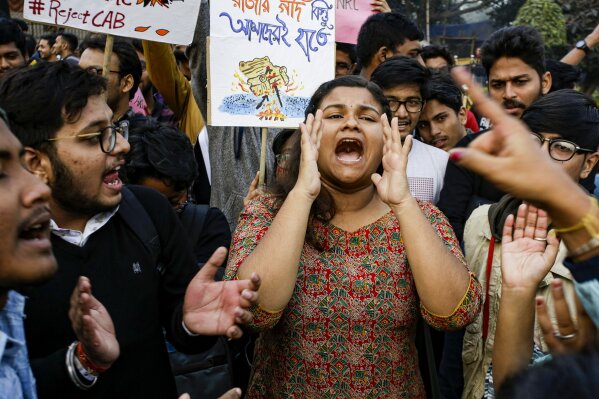Note: If you wish to receive, via e-mail, (1) my weekly newsletter or (2) daily copies of these posts, write to me at rrbates1951@gmail.com. Comments may also be sent to this address. I promise not to share your e-mail with anyone. To unsubscribe, write here as well.
Wednesday
Recently I encountered a fascinating article about how Indians are using poetry to protest the Prime Minister Narendra Modi’s attacks on India’s Muslim minority. Krupa Shandilya, professor of Sexuality, Gender, and Women’s Studies at Amherst College notes that protesters have turned to two poems in particular: “Tum Dekhogey” (“You Will See”), by contemporary poet and Bollywood lyricist and scriptwriter Hussain Haidry, and “Hum Dekhenge” (“We Will See” or “On That Day”) by Pakistani poet (although he was born in pre-partition India) Faiz Ahmed Faiz.
Shandilya says that, in 2019, university campuses and Muslim neighborhoods were “packed with people who, day after day, chanted slogans, belted out songs and recited poetry.” The poetry, she observes, “seemed to unsettle the government the most” so that dissenters reciting the protest poems “were accused of spreading hate against India, beaten and arrested by the police.”
As a scholar and translator of Urdu poetry, Shandilya writes that she was moved by the way that Haidry’s “You Will See”” described the state’s violence against peaceful protesters. “For me,” she says, “the poem crystallizes the disturbing turn of events in a country that once prized secularism, democracy and free expression.
“Because poems like Haidry’s directly challenge state power,” she adds, “the government and its supporters seek to portray them as seditious and anti-Indian.”
“You Will See” was inspired by a 101-day sit-in by Muslim women in Shaheen Bagh, a Muslim neighborhood in Delhi. Written from the perspective of those women, the poem “lambastes the silent bystanders who do nothing as hardcore Hindu nationalists – who believe in Hindu supremacy – terrorize religious minorities”:
You Will See
By Hussain Haidry
Trans. by Krupa Shandilya
Yes, you too will see
This night spent on the streets,
this ice in our breath,
This brutal, unjust night,
this too will be your fate
When the tyrant attacks you, you stifle your screams
When you beg for justice, you are battered instead
When trapped in saffron cages,
eating roti dipped in water –
Our slaughtered faces will appear before you
We will curse you, we will spit on you
And Hindustan will be but a hollow word –
scared, cowardly
hell, slaughterhouse – and you will lament:
I was there and so were you
Then the tyrant will laugh and say:
I was there and so were you
Shandilya says that the line “This night on the street, this ice in our breath” refers to the frigid winter nights that the women of Shaheen Bagh endured during their sit-in, when they had no access to heat or electricity. The peaceful protesters endured the attacks and the battering of Hindu nationalists. The “saffron cages” can refer either to religious intolerance in general or to the actual jail cells in which the protesters were imprisoned. Saffron is the color used by Modi’s ruling party, the BJP.
The other poem showing up in protests, Faiz’s “On that Day,” was actually written to protest the Pakistani dictator Muhammad Zia ul Haq in 1979 but it has been adapted by Indian Muslim to protest Modi’s Rule:
On That Day
by Faiz Ahmed
Trans. Jennifer Dubrow
That day will come
Yes, that day will come
That day we have been promised
When mountains of tyranny and oppression
will float away like cotton
And the earth will tremble and shake
under the feet of the oppressed
The sky will thunder and roar
on the heads of the arbitrators
False idols will be uprooted
from the Ka’ba of God’s earth
And the pure-hearted will be seated in places of honor
Thrones will be smashed
And crowns overthrown
On that day
Only the name of God shall remain
Who is both present and unseen
Who is both the observer and the perceived
On that day
The cry of “I am God!” will resound
The God that is in you and me
And the earth shall be ruled by those whom God created
The people, who are you and me
Shandilya says that this poem was the most recited poem at Shaheen Bagh and other sites during the 2019 protests. In adapting it to their purposes, she notes, the protesters tapped into a long tradition of reciting poetry as a form of protest so that “poems from the past often evolve to become freshly relevant.” And because the tradition is primarily an oral one—even though the poems appear in print—they are “recited as poems and sung as songs at marches, protests and on university campuses. As a result, they can reside in the popular imagination decades after their publication.”
Reading Shamilya’s account, I am struck by how these poems function as (to draw on Franz Fanon’s classic anti-colonialist work Wretched of the Earth) a literature of combat. Those who draw on them may be disempowered minorities lacking the firepower of the state, but they have language at its most powerful to bolster them.
To be sure, Fanon points out that poetry can’t change politics on its own. Indeed, in dark times (here I draw on Percy Shelley) poetry may be able to do little more than keep the spark of hope alive. But at other times, poetry can become an indispensable ally in the battle for political freedom.
As it was in the 2019 demonstrations, when it helped the protesters accomplish something tangible. According to Shamilya, due to the protests and the widespread outcry, an anti-Muslim law was put on hold.


